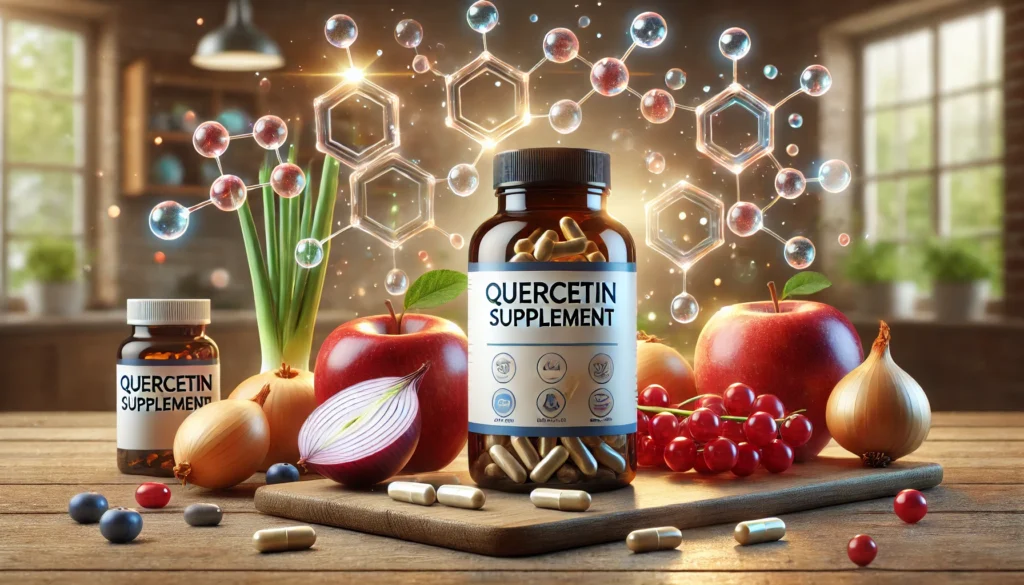Quercetin is a naturally occurring flavonoid found in various plant-based foods, known for its antioxidant, anti-inflammatory, and antiviral properties. While quercetin is often associated with improving immune function and reducing inflammation, there is growing interest in its potential as a nootropic supplement due to its impact on brain health and cognitive function. This article provides an in-depth examination of quercetin, its chemistry, physiological effects, nootropic potential, dosage recommendations, safety considerations, and interactions with other drugs and supplements.
You May Also Like:
Quercetin: Potential Nootropic Benefits, Dosage, Side Effects, Interactions and Other Important Information About This Supplement is an original (NootropicsPlanet) article.
Sources of Quercetin
Quercetin is abundant in a variety of fruits and vegetables, particularly those with deep-colored skins. Common dietary sources of quercetin include:
- Apples: Especially in the skin, apples provide a significant amount of quercetin.
- Onions: Red and yellow onions are rich in quercetin, contributing to their health benefits.
- Berries: Blueberries, blackberries, and cranberries contain notable levels of quercetin.
- Leafy greens: Spinach and kale are also good sources.
- Capers: Though less commonly consumed, capers boast some of the highest quercetin concentrations.
- Other sources: Green tea, red wine, and certain herbs like cilantro and parsley also contribute to dietary quercetin intake.
Though a balanced diet can provide ample amounts of quercetin, supplementation is often considered for individuals seeking its more concentrated benefits, particularly for its potential nootropic effects.

Chemistry of Quercetin
Chemically, quercetin belongs to a class of polyphenolic compounds called flavonoids, specifically classified as a flavonol. Its molecular structure includes a flavone backbone (2-phenyl-4H-chromen-4-one) with hydroxyl groups attached at specific positions. These hydroxyl groups contribute to quercetin’s strong antioxidant activity by scavenging free radicals, thereby protecting cells from oxidative stress.
Quercetin can be found in its free form (aglycone) or conjugated to sugars, where it exists as glycosides. Once ingested, quercetin is metabolized primarily in the small intestine and liver, where it undergoes glucuronidation, methylation, or sulfation. These metabolic processes transform quercetin into various bioactive metabolites that can circulate through the bloodstream and interact with tissues, including the brain.
Physiological Mechanisms of Quercetin in the Body and Brain
Quercetin exerts numerous physiological effects, many of which may contribute to its proposed nootropic benefits:
- Antioxidant Effects: Quercetin’s strong antioxidant properties are due to its ability to neutralize reactive oxygen species (ROS) and reactive nitrogen species (RNS), which can damage neurons and other cells. In the brain, oxidative stress is linked to cognitive decline and neurodegenerative diseases such as Alzheimer’s and Parkinson’s. By reducing oxidative damage, quercetin may help protect against these conditions.
- Anti-Inflammatory Action: Quercetin inhibits the production of pro-inflammatory cytokines, such as interleukins and tumor necrosis factor-alpha (TNF-α), through the modulation of signaling pathways like nuclear factor kappa B (NF-κB) and mitogen-activated protein kinase (MAPK). Chronic inflammation has been implicated in cognitive impairments and mood disorders, so reducing inflammation could enhance mental clarity and focus.
- Neuroprotection: Quercetin has been shown to cross the blood-brain barrier, where it may exert direct protective effects on neurons. It can prevent excitotoxicity—an overactivation of neurons that leads to cell death—by regulating calcium ion flow and modulating glutamate receptors. Additionally, quercetin can promote autophagy, a cellular process that clears damaged proteins, which is crucial for brain health.
- Promotion of Cerebral Blood Flow: Quercetin may enhance blood circulation in the brain, supporting oxygen and nutrient delivery to neurons. Improved cerebral blood flow is associated with better cognitive performance and reduced risk of stroke and dementia.

Nootropic Benefits of Quercetin
The growing interest in quercetin as a nootropic stems from its ability to support several aspects of brain function. Although quercetin is not yet a mainstream nootropic, preliminary research and its known physiological actions suggest potential cognitive benefits:
- Enhanced Cognitive Performance: Quercetin’s ability to reduce oxidative stress and inflammation may protect against age-related cognitive decline. Studies on animals have shown that quercetin supplementation can improve learning, memory, and overall cognitive performance. While human studies are still limited, these findings suggest that quercetin could be useful for enhancing mental clarity and focus.
- Mood Regulation: Quercetin’s impact on inflammatory pathways may also contribute to improved mood and reduced symptoms of anxiety and depression. Chronic inflammation has been linked to mood disorders, and by modulating inflammatory markers, quercetin may help regulate mood.
- Neuroprotective Effects in Aging: Due to its antioxidant and anti-inflammatory properties, quercetin may help prevent neurodegenerative diseases like Alzheimer’s. Animal studies have shown that quercetin supplementation can reduce the formation of beta-amyloid plaques, which are implicated in Alzheimer’s disease. Additionally, quercetin’s support of autophagy could be beneficial in clearing misfolded proteins that accumulate with age.
- Improved Stress Response: Quercetin may enhance the body’s resilience to physical and mental stress by regulating cortisol levels and reducing inflammation in the hypothalamic-pituitary-adrenal (HPA) axis. Lowered stress hormone levels contribute to improved cognitive function and mood stability.
- Exercise-Induced Cognitive Enhancement: Physical exercise is known to boost cognitive function, and quercetin may enhance this effect by increasing mitochondrial biogenesis and reducing exercise-induced oxidative damage. Studies in athletes suggest that quercetin can improve endurance and recovery, which may indirectly support cognitive performance.

Dosage and Supplementation Guidelines
Quercetin is available in several forms, including capsules, powders, and liquids. The optimal dosage for quercetin supplementation depends on the intended use, with cognitive health and nootropic purposes requiring different considerations from its use for general anti-inflammatory effects.
- General Nootropic Dosage: Most studies on quercetin’s cognitive benefits use dosages ranging from 500 to 1,000 mg per day. This dosage range appears to be well-tolerated by most individuals and may provide antioxidant and neuroprotective benefits. For enhanced bioavailability, quercetin is often combined with other supplements such as bromelain or vitamin C, which improve its absorption.
- Therapeutic Dosage for Anti-Inflammation: For its anti-inflammatory effects, quercetin doses as high as 1,200 mg per day have been studied in clinical settings, particularly for reducing symptoms of inflammatory conditions like arthritis. However, such high doses should only be taken under medical supervision.
- Bioavailability Considerations: Quercetin has low bioavailability, meaning that only a small fraction of ingested quercetin reaches systemic circulation. Some supplements include quercetin in nanoparticle or liposomal formulations to enhance absorption. Alternatively, pairing quercetin with fat-containing meals can improve its uptake in the body.
Side Effects and Safety
Quercetin is generally regarded as safe, especially when consumed in amounts typical of a balanced diet. However, higher doses, particularly from supplements, can produce side effects, some of which may be mild and others potentially more serious.
- Common Side Effects: Gastrointestinal discomfort, including nausea, upset stomach, and diarrhea, are the most frequently reported side effects of quercetin supplementation. These effects are more common at higher doses, such as those exceeding 1,000 mg per day.
- Kidney Concerns: There are some concerns that high doses of quercetin may lead to kidney damage, particularly when taken in large amounts over extended periods. Individuals with pre-existing kidney conditions should avoid high-dose quercetin supplements without medical supervision.
- Potential for Allergic Reactions: Though rare, some individuals may experience allergic reactions to quercetin. Symptoms may include itching, rash, and difficulty breathing. Those with known sensitivities to flavonoids or certain foods high in quercetin should be cautious.

Interactions with Other Supplements and Medications
Quercetin can interact with several medications and supplements, either enhancing or diminishing their effects. It is essential to be aware of these interactions, particularly for individuals taking prescription medications or other potent supplements.
- Blood Thinners: Quercetin can enhance the effects of anticoagulant medications such as warfarin, increasing the risk of bleeding. Individuals on blood-thinning medications should consult their healthcare provider before supplementing with quercetin.
- Antihypertensive Medications: Quercetin may lower blood pressure, which can be beneficial for individuals with hypertension. However, when combined with antihypertensive drugs, this effect could lead to excessively low blood pressure (hypotension).
- Corticosteroids: Quercetin may interfere with the metabolism of corticosteroids, such as prednisone, potentially reducing the efficacy of these drugs. This interaction is especially important for individuals using corticosteroids to manage chronic conditions like asthma or autoimmune diseases.
- Chemotherapy Drugs: Some evidence suggests that quercetin may interact with chemotherapy drugs, either enhancing their efficacy or reducing their effectiveness, depending on the type of cancer and drug used. Patients undergoing cancer treatment should consult their oncologist before taking quercetin supplements.
- Other Nootropics: Quercetin is often combined with other nootropics, such as caffeine, L-theanine, or Bacopa monnieri. While these combinations may enhance cognitive performance, it’s essential to monitor individual responses and adjust dosages as necessary.
Conclusion
Quercetin is a promising natural compound with various potential nootropic benefits, supported by its antioxidant, anti-inflammatory, and neuroprotective properties. While existing research primarily stems from animal studies, the implications for human cognitive health and well-being are encouraging.
As with any supplement, it is essential to consider individual health conditions and consult with a healthcare professional before starting quercetin supplementation, particularly at higher doses. With careful usage, quercetin could be a valuable addition to a cognitive-enhancing regimen for those seeking to optimize their brain health and overall well-being.

References:
- What are the benefits of quercetin?. Retrieved from: https://www.medicalnewstoday.com/articles/324170
- Quercetin: Benefits, Side Effects, Dosage, and Foods. Retrieved from: https://www.healthline.com/nutrition/quercetin
- Quercetin – Uses, Side Effects, and More. Retrieved from: https://www.webmd.com/vitamins/ai/ingredientmono-294/quercetin
- Quercetin: Side Effects, Dosage, and Interactions. Retrieved from: https://www.verywellhealth.com/the-benefits-of-quercetin-89071
- Recent Advances in Potential Health Benefits of Quercetin. Retrieved from: https://pubmed.ncbi.nlm.nih.gov/37513932/
Important Note: The information contained in this article is for general informational purposes only, and should not be construed as health or medical advice, nor is it intended to diagnose, prevent, treat, or cure any disease or health condition. Before embarking on any diet, fitness regimen, or program of nutritional supplementation, it is advisable to consult your healthcare professional in order to determine its safety and probable efficacy in terms of your individual state of health.
Regarding Nutritional Supplements Or Other Non-Prescription Health Products: If any nutritional supplements or other non-prescription health products are mentioned in the foregoing article, any claims or statements made about them have not been evaluated by the U.S. Food and Drug Administration, and such nutritional supplements or other health products are not intended to diagnose, treat, cure, or prevent any disease.


